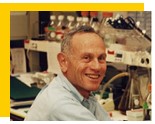NFCR Translational Research: Blood Cancer
Revolutionary Drug Platform Improves Effectiveness and Tolerability of Cancer Treatment for Multiple Myeloma

Jerimiah A. Johnson, Ph.D. Massachusetts Institute of Technology, Boston, MA
The toxicity and side effects of many treatments for cancer often limit their potential effectiveness for many patients. Chemist Dr. Jerimiah T. Johnson has developed a unique chemical shell to surround drugs that forms an inactive “pro-drug”. Only in the tumor areas are “pro-drugs” are released from the shell, providing high doses of active drugs to tumors, optimizing killing of cancer cells. The shell does not release active drugs in healthy tissues, eliminating drug toxicities for patients. Immunotherapies, targeted therapies and other cancer treatments packaged as pro-drugs demonstrate superior effects in complex cancer models compared to standard treatments. NFCR translational research funds are supporting this platform of development of pro-drugs for various types of cancer. Dr. Johnson is bringing his novel platform to clinical trials for patients. Bortezomib used in treatment of Multiple Myeloma is one of the first pro-drug candidates and is completing pre-clinical studies to prepare for the IND-application and FDA-approval to advance to clinical trials.
New Treatment to Start Clinical Trials for non-Hodgkin T-cell Lymphoma Patients Who No Longer Respond to Standard Therapy

Michael B. Sporn, M.D. formerly of Geisel School of Medicine at Dartmouth, Hanover, NH
Many patients with non-Hodgkin T-cell Lymphoma can experience relapse to current therapies, and their cancer continues to progress. Fenretinide, a drug similar in structure to Vitamin A, may offer patients a life-saving treatment. Previously, former NFCR-funded scientist, Dr. Michael Sporn, researched fenretinide and proved its safety in humans for other cancers. Subsequently, the drug demonstrated safety and effectiveness in patients. Fenretinide is toxic to cancer cells by activating the cell suicide pathway (apoptosis). Scientists have now shown fenretinide reactivates the immune system to complement apoptosis and it is effective in models of non-Hodgkin T-cell Lymphoma. NFCR’s support helped develop a unique delivery system for fenretinide and gain FDA approval to treat non-Hodgkin T-cell Lymphoma patients who no longer respond to their current therapy. Enrollment in a Phase 1 trial will begin soon.
Repurposing a Malaria Drug for Acute Myeloid Leukemia

Curt I. Civin, M.D. University of Maryland, Baltimore, MD
Leukemia is a great success story for cancer research — one in which Dr. Civin played an important role. His early work on bone marrow stem cell transplantation was partially responsible for the increased 5-year survival for all types of leukemia over the past 20 years.
Dr. Civin’s current research may hold the key for Acute myeloid leukemia(AML), the deadliest form of leukemia. He recently discovered that artemisinins — a class of drugs to successfully treat malaria — can effectively kill AML cancer cells. Artemisinin also work well in combination with established anti-leukemia drugs.
Modeling for the best design is developing the most effective artemisinin. NFCR’s funds are accelerating the required pre-clinical research of the lead drug to apply for the IND (Investigational New Drug) application and approval from the FDA in order to begin Phase 1 clinical trials and treat AML patients.
New Treatment for AML in Children

Cesare Spadoni, Ph.D., MBA University of London
Dr. Cesare Spadoni is leading the development of treatments for the most common pediatric cancers with the poorest prognosis including Acute Myeloid Leukemia. In the oncology community, there is a void of cancer drugs specifically developed to treat children. His team identifies and characterizes new oncogenic pathways and the pathway interconnections may facilitate development of novel pediatric cancer drugs, ensuring more effective and less toxic cancer treatments. With this information, the scientists aim to repurpose known drugs and identify new combinations of drugs for pediatric cancers. They hope this research and drug discovery philosophy will bring a new treatment for AML in children.
BASIC RESEARCH PROJECTS
Dr. Wei Zhang, a leader in precision oncology, characterizes underlying genetic mechanisms responsible for cancer growth and progression. Dr. Zhang’s precision oncology approach has the potential to improve outcomes for T cell non-Hodgkin’s lymphoma and Acute Myeloid leukemia (AML) patients that have stopped responding to standard treatments.










